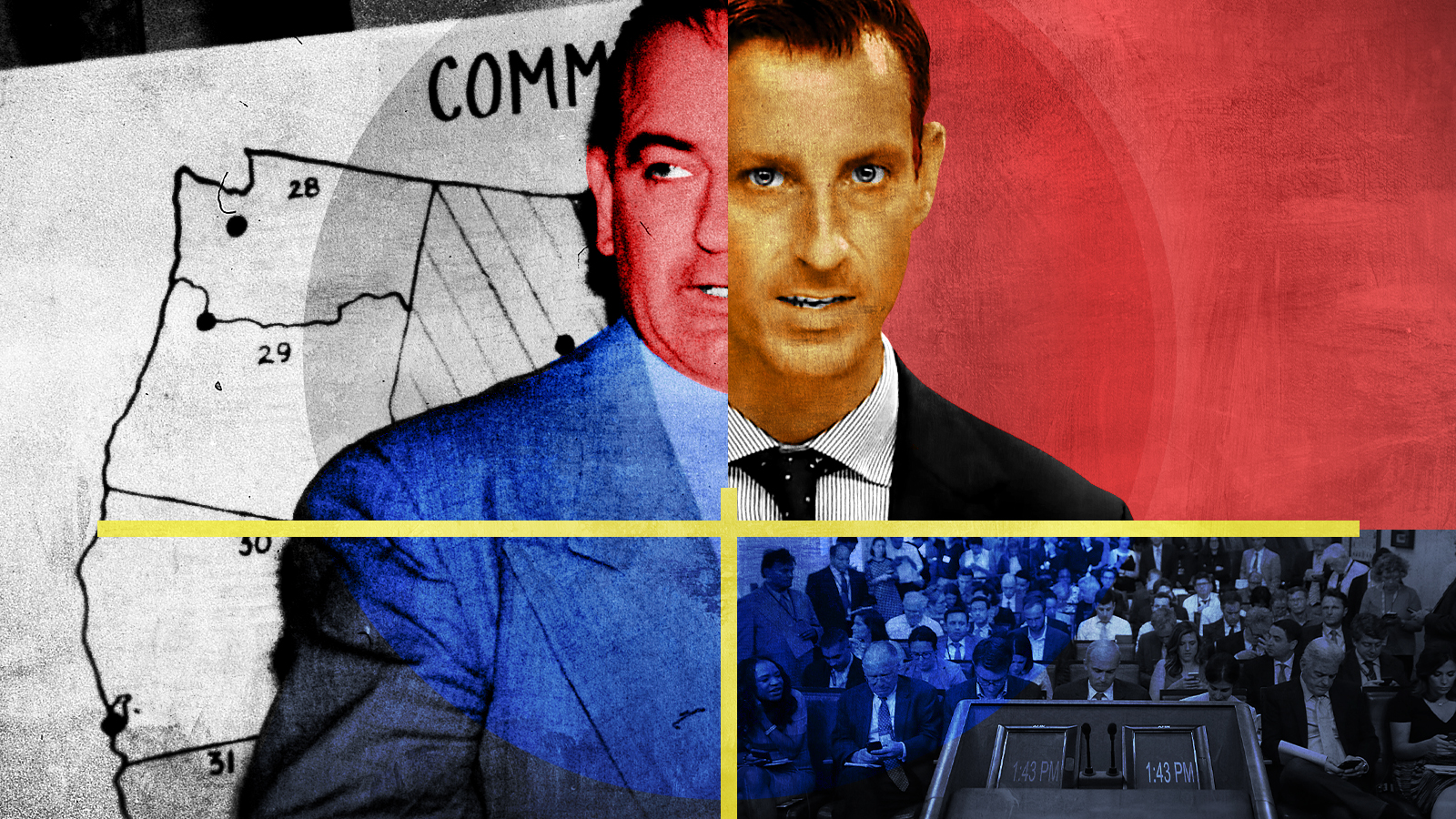The Biden administration falls back on an old, ugly tactic to evade tough questions


A free daily email with the biggest news stories of the day – and the best features from TheWeek.com
You are now subscribed
Your newsletter sign-up was successful
It was a reasonable question.
On Thursday, State Department spokesman Ned Price went before reporters and announced the United States has evidence that Russia was planning a "false flag" attack by Ukrainians to justify an invasion of Ukraine. Associated Press writer Matt Lee asked the obvious, necessary follow-up question: What's your evidence for that?
Things got testy.
The Week
Escape your echo chamber. Get the facts behind the news, plus analysis from multiple perspectives.

Sign up for The Week's Free Newsletters
From our morning news briefing to a weekly Good News Newsletter, get the best of The Week delivered directly to your inbox.
From our morning news briefing to a weekly Good News Newsletter, get the best of The Week delivered directly to your inbox.
"If you doubt the credibility of the U.S. government, of the British government, of other governments and want to, you know, find solace in information that the Russians are putting out, that is for you to do," Price ultimately said, after a tense back-and-forth. It was a non-responsive answer — and smacked more than a little bit of McCarthy Era red-baiting. You don't trust what we're saying? Maybe you believe the bad guys, huh?
But this kind of thing is becoming routine in the Biden Administration. Also on Thursday, White House Press Secretary Jen Psaki pushed back on a question about civilian casualties in the U.S. raid that killed ISIS leader Abu Ibrahim al-Hashimi al-Qurayshi. The U.S. alleged al-Qurayashi had detonated a bomb that killed the innocents; a reporter again pressed for evidence of the claim. "And ISIS is providing accurate information?" Psaki shot back. This came a few days after she accused Sen. Josh Hawley (R-Mo.) of parroting "Russian talking points" by opposing NATO membership for Ukraine.
Let's be clear: When it comes to matters of war and rumors of war, the U.S. government has very little credibility. The tidal wave of misinformation that led to the Iraq War is the most obvious modern example, but it's far from the only one. Just last fall, military leaders called a Kabul drone strike a "righteous" attack on a terrorist — only to later concede a family of 10 had been killed. Former President Donald Trump's rationale for the assassination of an Iranian leader in 2020 ended up looking pretty flimsy, too. This kind of thing happens all the time. No matter which party is running the government, U.S. officials don't get to use the "trust us" arguments on matters of life and death, ever.
It's also an old, ugly tactic to suggest reporters' sympathies and trust might be more aligned with America's rivals and enemies — a trick that's a step removed, at best, from Trump's much-decried attacks on journalists as "enemies of the people." It's easy to lob accusations at critics and questioners rather than answer uncomfortable queries, and it's not better or more defensible when a Democratic administration does it.
A free daily email with the biggest news stories of the day – and the best features from TheWeek.com
Even in the best of times, politicians and governments will have prickly relationships with the media. That's fine, and even desirable. But red-baiting from high officials is never acceptable. Just answer the damn question.
Joel Mathis is a writer with 30 years of newspaper and online journalism experience. His work also regularly appears in National Geographic and The Kansas City Star. His awards include best online commentary at the Online News Association and (twice) at the City and Regional Magazine Association.
-
 Ex-South Korean leader gets life sentence for insurrection
Ex-South Korean leader gets life sentence for insurrectionSpeed Read South Korean President Yoon Suk Yeol was sentenced to life in prison over his declaration of martial law in 2024
-
 At least 8 dead in California’s deadliest avalanche
At least 8 dead in California’s deadliest avalancheSpeed Read The avalanche near Lake Tahoe was the deadliest in modern California history and the worst in the US since 1981
-
 Political cartoons for February 19
Political cartoons for February 19Cartoons Thursday’s political cartoons include a suspicious package, a piece of the cake, and more
-
 ‘The mark’s significance is psychological, if that’
‘The mark’s significance is psychological, if that’Instant Opinion Opinion, comment and editorials of the day
-
 Big-time money squabbles: the conflict over California’s proposed billionaire tax
Big-time money squabbles: the conflict over California’s proposed billionaire taxTalking Points Californians worth more than $1.1 billion would pay a one-time 5% tax
-
 The ‘mad king’: has Trump finally lost it?
The ‘mad king’: has Trump finally lost it?Talking Point Rambling speeches, wind turbine obsession, and an ‘unhinged’ letter to Norway’s prime minister have caused concern whether the rest of his term is ‘sustainable’
-
 Did Alex Pretti’s killing open a GOP rift on guns?
Did Alex Pretti’s killing open a GOP rift on guns?Talking Points Second Amendment groups push back on the White House narrative
-
 Washington grapples with ICE’s growing footprint — and future
Washington grapples with ICE’s growing footprint — and futureTALKING POINTS The deadly provocations of federal officers in Minnesota have put ICE back in the national spotlight
-
 Trump’s Greenland ambitions push NATO to the edge
Trump’s Greenland ambitions push NATO to the edgeTalking Points The military alliance is facing its worst-ever crisis
-
 Why is Trump threatening defense firms?
Why is Trump threatening defense firms?Talking Points CEO pay and stock buybacks will be restricted
-
 A running list of the international figures Donald Trump has pardoned
A running list of the international figures Donald Trump has pardonedin depth The president has grown bolder in flexing executive clemency powers beyond national borders
